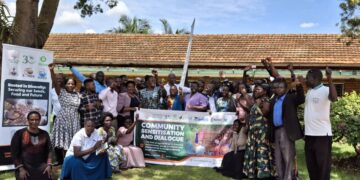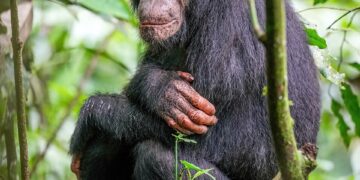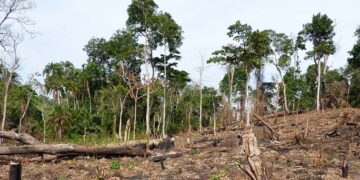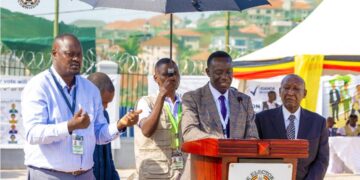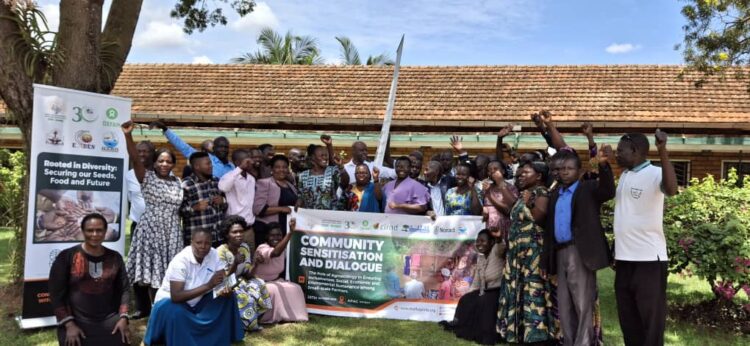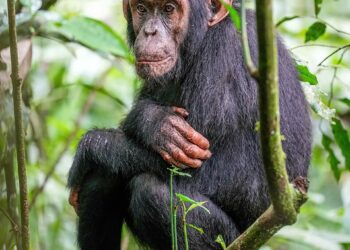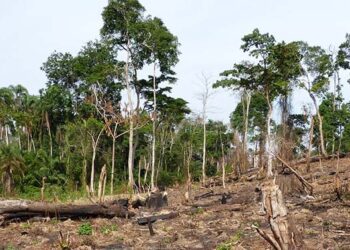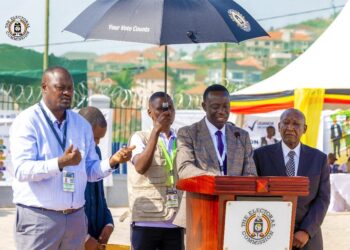By Leonard Kamugisha Akida,
WAKISO
The Eastern and Southern Africa Small Scale Farmers Forum (ESAFF) Uganda has launched the National Agroecology Festival 2025.
“When we protect our soils, save our seeds, and grow food that respects nature, we protect our future. Resilience starts with us,” says Hakim Baliraine Board Chairman ESAFF.
Speaking at the launching ceremony held at Namugongo Kyoto, (Les Foyers de Charite) Kampala on Monday, ESAFF Uganda National Coordinator, Nancy Mugimba, said the festival seeks to promote agroecological practices that restore ecological balance and empower farmers to build climate-resilient food systems.
“Agroecology is not just about farming, it’s a philosophy of life that centers the voices of small-scale farmers. They hold the knowledge to nurture both people and the planet,” Mugimba said.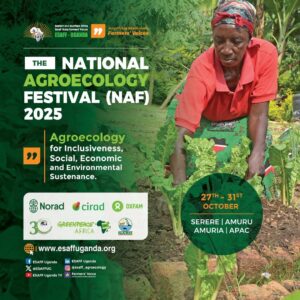
She emphasized the urgent need to shift from extractive agricultural models to more regenerative systems led by small-scale farmers themselves.
“We are uniting communities, scientists, and policymakers to co-create a future where food systems are fair, sustainable, and resilient,” Mugimba added.
The one week-long festival will include celebrations, and dialogue on sustainable agriculture, climate resilience, and food sovereignty. It’s being organized by ESAFF Uganda, in partnership with National Agricultural Research Organization (NARO), and with support from Oxfam in Uganda, Greenpeace Africa and The Norwegian Agency for Development Cooperation (Norad) will run until October 31st.
Throughout the week, participants will engage in community dialogues, farm visits, exhibitions, and earth markets. Small-scale farmers are showcasing indigenous seeds, local foods, herbal medicines, and cultural practices that reflect Uganda’s rich biodiversity.
The activities for the festival according to ESAFF are spread across Apac, Serere, Amuria and Amuru districts under the theme: “Agroecology for Inclusiveness, Social, Economic and Environmental Sustenance.”
In Serere District, preparations are underway to launch a Community Seed Bank to preserve traditional crop varieties and improve access to quality planting materials. The facility will also act as a learning center for sustainable agriculture.
ESAFF Uganda Board Chairperson Hakim Baliraine said the festival comes at a time when farmers need urgent support to adapt to the changing climate.
“For us small scale farmers, agroecology is about restoring balance, when we protect our soils, save our seeds, and grow food that respects nature, we safeguard our future, we are protect our farms from the negative impacts of climate change. We are not waiting for solutions to come from outside; we are demonstrating that resilience begins with us,” Baliraine said.
Uganda’s agricultural sector, largely dominated by small-scale farmers, employs over 75 percent of the population and contributes significantly to GDP and export earnings, according to the Uganda Bureau of Statistics (UBOS). However, farmers continue to grapple with challenges arising from climate change, unpredictable weather, land conflicts, and poor access to quality seeds.
ESAFF maintains that popularizing best agroecological practices among small-scale farmers, and their communities as well as local leaders would address these challenges as well as emphasizing their role in environmental conservation and mitigating climate change impacts.
Additionally, ESAFF says that the festival provides a critical platform for conversations around market access and policy transformation to many small holder farmers who struggle to find fair and reliable markets for their produce despite growing consumer interest in organic and ecologically produced foods. Since 2019, ESAFF Uganda has been championing smallholder-driven agricultural transformation that restores ecological balance and empowers local communities to produce healthy food
ESAFF Vice Chairperson Masudio Margaret from Adjumani District called for stronger government commitment to farmer-led innovations.
“We cannot talk about food security without talking about farmer security, small-scale farmers feed Uganda, yet they remain the least supported,” says Masudio. “Agroecology offers a path that is inclusive and sustainable, but it must be backed by policies that guarantee fair markets, access to affordable credit, and recognition of farmers’ rights to their seeds.”
The festival is expected to actualize partnerships likely to strengthen local markets for agroecological produce, enhance household incomes, and improve food diversity within communities.
